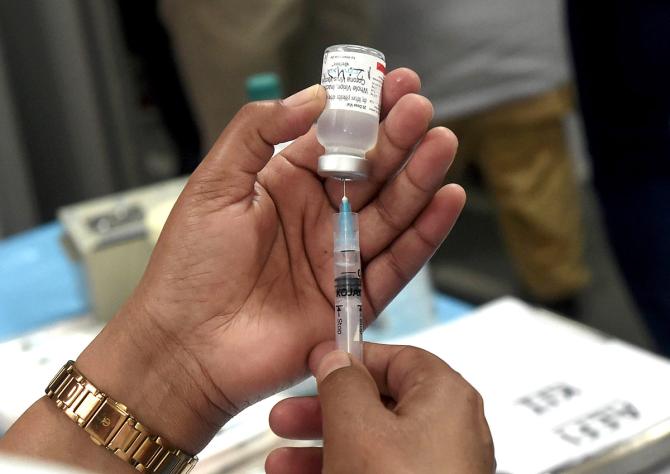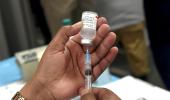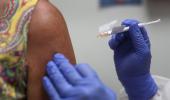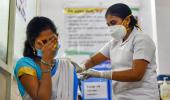The Centre on Wednesday announced that people over 60 years and those above 45 with comorbidities can get COVID-19 vaccine from March 1 even as it cautioned states and union territories that any laxity in implementing stringent curbs, especially in view of new virus strain observed in certain countries, could "compound the situation".

As new coronavirus cases crossed the 13,000 mark for the third time in six days on Wednesday, the Centre rushed multi-disciplinary teams to nine states and the union territory of Jammu and Kashmir most of whom are witnessing a surge to support them in effectively tackling the pandemic.
The nine states are Maharashtra, Kerala, Chhattisgarh, Madhya Pradesh, Gujarat, Punjab, Karnataka, Tamil Nadu and West Bengal. COVID-19 cases rose sharply in Maharashtra with the state reporting 8,807 new infections, taking its total count to 21,21,119, the state health department said. The western state had reported 6,218 new COVID-19 cases on Tuesday.
A decision on the next phase of COVID-19 vaccination was taken at a meeting of the Union Cabinet under the chairmanship of Prime Minister Narendra Modi. The vaccine will be offered free at government facilities and for a charge at many private hospitals, it was stated.
"The second phase of the world's largest vaccination drive will start from Monday in which anybody above 60 years, that may not be less than 10 crore people in the country, and 45 years plus with co-morbidities will be given vaccines in 10,000 government medical facilities and also over 20,000 private hospitals," Information and Broadcasting Minister Prakash Javadekar told a media briefing.
"Whoever goes to the government centre will be administered vaccine free of cost. Indian government will pay for them. The government will purchase the necessary doses and will send them to all the states."
Javadekar said those who want to get vaccination from private hospitals will have to pay, but the amount will be decided by the health ministry within the next three-four days as they are in discussions with manufacturers as well as hospitals.
Asked if people will have a choice of vaccine, Covishield or COVAXIN, Javadekar said India is proud to have two vaccines which are both effective with proven efficacy.
While Oxford-AstraZeneca's Covishield is manufactured by the Serum Institute, COVAXIN is produced by Bharat Biotech.
Javadekar asserted that vaccination in India has been successful, "faultless with hardly any complaints".
Asked whether ministers and the prime minister, who would be now be in the category of those who can take the vaccination, will get inoculated, Javadekar said those who want to take the jabs can take it at the place of their choosing from March 1.
The Union Health ministry said the cumulative number of COVID-19 vaccine doses administered to healthcare and frontline workers has crossed 1.23 crore in the country. The countrywide COVID-19 vaccination drive was rolled out on January 16.
On the three–member multidisciplinary teams despatched to states, it said they are headed by joint secretary-level officers in the health ministry.
"These teams will work closely with the states and UT administration and ascertain reasons for the recent surge in the number of COVID-19 cases," it said in a statement.
The ministry said the teams will also coordinate with health authorities of the states and J and K for requisite COVID-19 control measures to break the chain of transmission.
"The Centre has reminded the states and UTs that any laxity in implementing stringent measures to curb the spread, especially in view of new strain of virus observed in certain countries, could compound the situation," the statement said.
Medical experts and scientists also cautioned that the spike in cases in some states is likely due to non-adherence of COVID-19 appropriate behaviour.
"I would say the surge is most likely due to non-adherence to COVID appropriate behaviour,” said noted virologist Shahid Jameel.
Rakesh Mishra, director of Hyderabad's CSIR-Centre for Cellular and Molecular Biology, also agreed that the current surge in certain states is less likely due to some new variant, and more likely due to people ignoring COVID protocols.
The Centre has also written to Maharashtra, Kerala, Chhattisgarh, Madhya Pradesh, Gujarat, Punjab and Jammu and Kashmir which have been witnessing a rise in daily COVID cases, along with decreasing proportion of the RT-PCR tests and rise in positivity in some districts.
In the letter, the Union Health Secretary has exhorted them to focus on undertaking aggressive measures to break the chain of transmission and ensure that RT-PCR testing is amplified to flush out hitherto undetected cases from the population.
These states and UTs have been advised to increase testing in a focussed manner in the affected districts with the appropriate split of RT-PCR and rapid antigen tests and to also ensure that all symptomatic negatives of antigen tests are compulsorily tested via RT-PCR tests, the health ministry statement said.
The positive persons must be promptly isolated/hospitalised, all their close contacts be traced and also tested without delay,it added.
As cases surged in some states, West Bengal made it mandatory for passengers travelling in flights from Maharashtra, Kerala, Karnataka and Telangana to produce negative COVID-19 report.
The Delhi government is also likely to ask travellers from five states-- Maharashtra, Kerala, Punjab, Chhattisgarh and Madhya Pradesh--to show negative COVID-19 test report before entering the national capital, officials said.
People travelling in flights, trains and buses from these states will have to produce negative test report before entering Delhi, they said.
With 13,742 new infections, India's COVID-19 count has gone up to 1,10,30,176 while recoveries are at 1,07,26,702, according to official data released on Wednesday.
There are 1,46,907 active coronavirus cases in the country, which comprises 1.33 per cent of the total caseload, the data stated.
In the past one week, 12 states have reported more than 100 average daily new cases. These are Maharashtra, Kerala, Tamil Nadu, Karnataka, Punjab, Gujarat, Madhya Pradesh, Chhattisgarh, West Bengal, Telangana, Delhi and Haryana, the health ministry said.
Kerala and Maharashtra reported more than 4,000 average daily new cases in the past week, it added.
At the same time, 19 states and UTs have not reported any death due to COVID-19 in a span of 24 hours.











 © 2025
© 2025